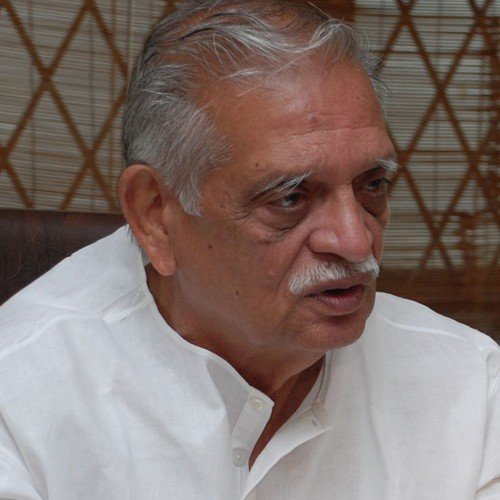
Gulzar
Artist · 1,472,211 Listeners
Some content courtesy of Wikipedia.
Born
August 18, 1936
Introduction
Gulzar is a renowned lyricist, screenwriter, producer and author, but above all, a poet first. All his creations have a certain poetic finesse and sensitivity, which strikes a chord with reviewers, and listeners as his works are laced with human sensibilities in his typical lyrical fashion.
Early Life
Being born in pre–partitioned India, Deena (now in Pakistan), Gulzar showed immense interest in antaksharis, shayiris and literature in his childhood days. He would listen to Hindustani Classical music played on stringed instruments at his neighbor’s place. By the time he went to college, he was very engrossed with music and would often attend concerts of contemporary musicians like Ravi Shankar and Ali Akbar Khan.
During partition, he had to move to India with his family. His family moved to Amritsar, but Gulzar moved onto Bombay (now Mumbai) to pursue his dreams. In his early days in Bombay, he worked as garage mechanic in Worli while writing poetry whenever he was free. Soon, his aspirations turned towards Bollywood.
Entry to Bollywood
Initially, he began to work under the film directors Hrishikesh Mukherjee and Bimal Roy. Gulzar’s book, Ravi Paar describes Bimal Roy and the agony of creation. Soon, Gulzar moved on to become a songwriter under S D Burman for the 1963 movie Bandini. Gulzar wrote the song Mora Gora Ang Layle, which was sung by Lata Mangeshkar in Bandini. In 1968, Gulzar wrote the lyrics and dialogues for the film Ashirwad, which gave the movie its’ much needed additional dimension and featured the rap song Rail Gaddi sung by Ashok Kumar. In that period, his other famous lyrics were for the songs like Humne Dekhi Hai Un Aankhon Ki Mehekti Khushboo for the 1969 film Khamoshi and Humko Man Ki Shakti Dena for the 1971 film Guddi. The latter song, is used as a prayer, in many Indian schools.
Being a lyricist, he had close associations with the likes of RD Burman, SD Burman, Shankar- Jaikishan, Hemant Kumar, Laxmikant Pyarelal and Anu Malik among others. Gulzar drew inspiration from Amir Khusrow’s Ay Sarbathe Aashiqui to write Ay Hairathe Aashiqui for Mani Ratnam’s Guru (2007) which had music composed by AR Rahman. His collaboration with AR Rahman continued and he wrote the lyrics of Chaiyya Chaiyya for the 1998 movie Dil Se.
Gulzar also won the Academy Award for Best Original Song for Jai Ho (Slumdog Millionaire in 2007). The song Jai Ho also won him a Grammy Award for Best Song Written for a Motion Picture, Television or Other Visual Media, which he shared with AR Rahman. His later work with AR Rahman saw him pen the lyrics for Raavan (2010). With Vishal Bhardwaj, he wrote the lyrics for songs for films like Maachis (1996), Omkara (2006) and Kaminey (2009). With Shankar-Ehsaan-Loy his lyrics were used for the movie Bunty Aur Babli (2005).
Some of the recent films he has written lyrics for in 2013 include, Matru Ki Bijlee Ka Mandola, Ek Thi Daayan, Shoebite and Dedh Ishqiya (2014).
Film Direction
Gulzar, after having written screenplay and dialogues for films like Aashirwad, Anand and Khamoshi turned his attention to film direction. He first directed the film Mere Apne (1971) which was a remake of Tapan Sinha’s Bengali film Apanjan (1969). Next, he directed the films Parichay and Koshish. Parichay was based on the novel Rangeen Uttarain by Raj Kumar Maitra while Koshish was about the struggles of a deaf and dumb couple. By 1973, he had developed a story based on the 1958 murder case KM Nanavati Vs State of Maharastra, which went in to the making of the movie Achanak. His other films included Aandhi and Khushboo followed up by Mausam (1975), which was based on the novel Judas Tree by A. J. Cronin and won Gulzar a Filmfare Best Film Director Award.
Poetry
Gulzar writes mainly in Urdu, Punjabi, and several dialects of Hindi such as Braj Bhasha, Khariboli, Haryanvi and Marwari. His poetry is mainly in Triveni type of stanza. His poem compilations include Chand Pukhraaj Ka, Raat Pashminey Ki and Pandrah Paanch Pachattar. His short stories are compiled in Raavi-paar (called Dustkhat in Pakistan) and Dhuan (smoke).
Recognitions
Gulzar was awarded the Padma Bhushan in 2004 for his contribution to the arts and the Sahitya Akademi Award in 2002. Gulzar received the 2013 Dadasaheb Phalke Award, the highest award of the Indian cinema, on 3 May 2014 at the 61st National Film Awards.
He was appointed as Chancellor of Assam University in April 2013
Awards
National Film Award for Best Screenplay for the Movie Koshish (1972)
Filmfare Awards
• Best Dialogue - Anand (1972)
• Best Dialogue - Namak Haraam (1974)
• Critics Award for Best Movie – Aandhi (1975)
• Best Director – Mausam (1976)
• Best Lyricist for Do Deewaane Shehar Mein from film Gharaonda (1978), Aanewala Pal Jaane Wala Hain from the film Gol Maal (1980), Hazaar Raahen Mud Ke Dekhi from film Thodisi Bewafaii (1981), Tujhse Naraaz Nahin Zindagi from the film Masoom (1984), Mera Kuchh Saamaan from the film Ijaazat (1989) and Yaara Silli Silli from film Lekin (1991) and many more.
Grammy Awards
• Best Song Written for a Motion Picture, Television or Other Visual Media for the song Jai Ho from film Slumdog Millionaire in 2010.